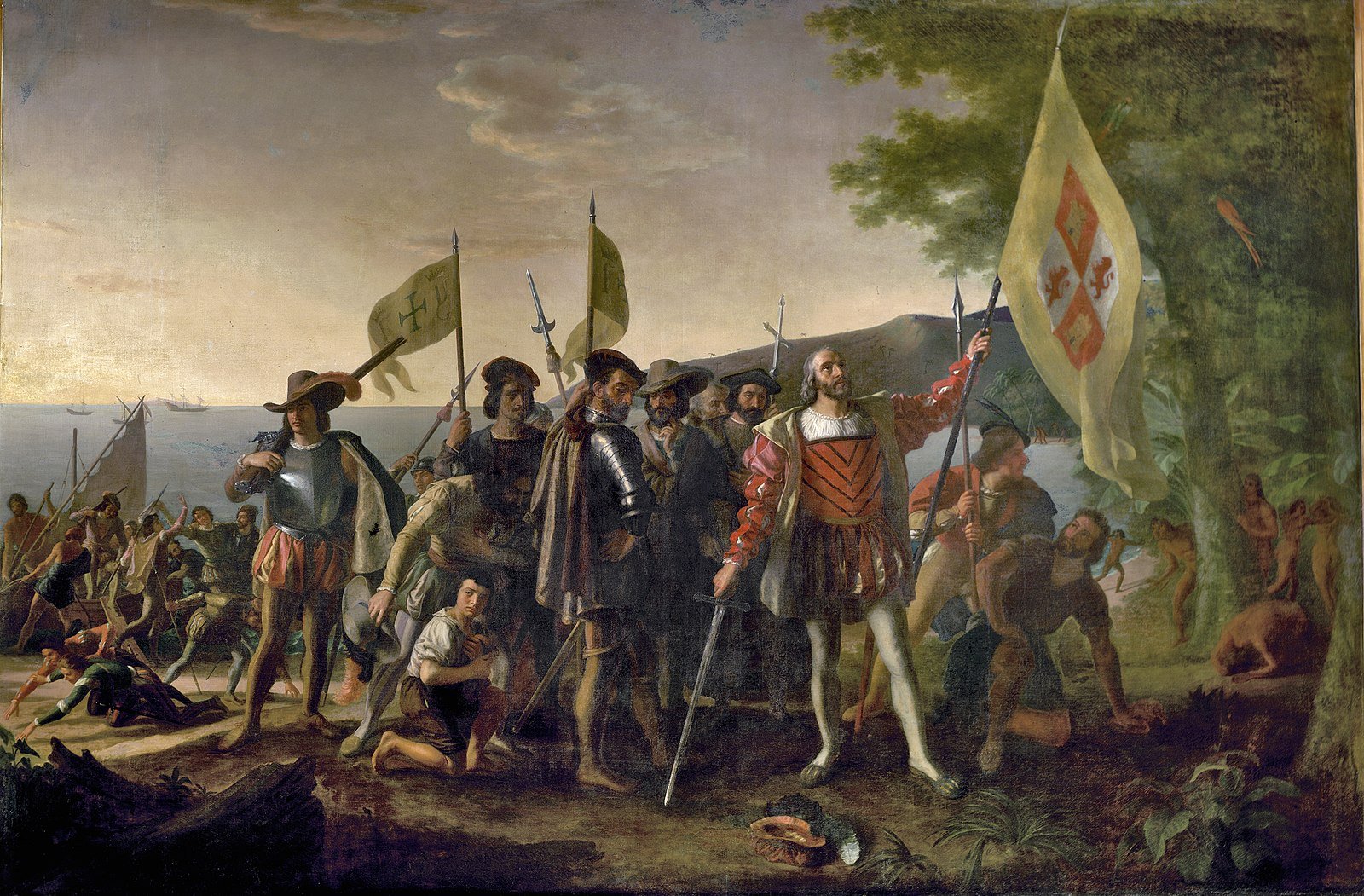How History Gets Passed On
He who controls the past controls the future. He who controls the present controls the past.
We’ve all heard the unsettling, yet unfortunately accurate phrase from George Orwell’s 1984. This truth is widely felt by Native and Black Americans whose history is becoming increasingly warped and convoluted. Accurate, unbiased history has been harder to come by in the last decade with ineffective social media monitoring and prejudiced educational legislation being passed. It is more important than ever to take it upon ourselves to discern whether or not our previous education failed us, and to find more truthful information if it did.
Images like this painting, Landing of Columbus by John Vanderlyn, distort the past while perpetuating a glorified, inaccurate view of history. Image from Wikimedia Commons.
Columbus did sail the ocean blue in 1492, but he didn’t make an entirely new discovery. Not only had the land been previously inhabited for centuries, he wasn’t the first European to find it. That title would go to Leif Erikson at some point between the 10th and 11th centuries.
If we learned that Columbus was the one who discovered America so early in our lives, what else were we told that is entirely false or, at the very least, distorted?
During some of our most formative years, we learned about historical atrocities like the Trail of Tears, slavery, Jim Crow legislation, etc. However, required education on these topics is dwindling. An article from the Journal of Interdisciplinary Public Policy says only 43% of the 28 states with federally recognized tribes require Native American history to be taught in schools. Furthermore, the history being taught doesn’t include the fact that white people were the ones inflicting the suffering.
A lot of this can be attributed to the negative stigma surrounding Critical Race Theory, abbreviated to CRT.
A concept that was once used to encourage awareness and inclusion is now unjustly deemed as a weapon of division. Simply put, the goal of CRT is to raise awareness when it comes to the prejudiced ideas and stereotypes and the ways in which they still plague people of color is western society, particularly in America.
Twenty-two states have already enacted legislation that bars any conversation of concepts in relation to race, ethnicity, or color in their public curriculums. This is a rejection of CRT.
Other than outright barring racial discussion though, states such as Florida have begun fabricating slavery, making an effort to exclude the barbaric and inhumane treatment black people experienced during the 18th and 19th centuries. The Florida Board of Education goes as far as asserting that “slaves developed skills which, in some instances, could be applied for their personal benefit.” The full scope of the violence and atrocities committed during this time are almost completely eliminated. Similarly to Native American history, very little is said about the fact that white people were the ones committing this violence.
Kevin Kruse, one of the authors of the book Myth America, notes the absurdities of this type of education by saying, “Anything that only speaks to the good parts of the country and ignores the flaws, that focuses more on aspirations than execution, is not history. It's propaganda.”
So, what does this mean for us?
It is more imperative than ever, not only to educate ourselves, but to educate others on a more accurate and truthful history. We must continue to discuss race and ethnicity, and the ways in which the privileged can help the oppressed. If not, history is far more likely to repeat itself.
Sources:
Burga, Solcyre. “Florida Approves Controversial Guidelines for Black History.” Time, Time, 20 July 2023, florida-board-of-education-black-history.
Contreras, Russell. “Historians Take on Misinformation in U.S. History - Axios.” Axios, 27 Jan. 2023, www.axios.com/2023/01/27/historians-take-on-misinformation-in-us-history.
Kushi, Ty. “Native American History: The Need for a Comprehensive Curriculum: Public Policy for & by Students: Jipp.” The Journal of Interdisciplinary Public Policy, The Journal of Interdisciplinary Public Policy, 4 Sept. 2021, https://jipp.org/read/2-3-native-american-history.
Medrano, Lourdes. “States Were Adding Lessons about Native American History. Then Came the Anti-CRT Movement.” The Hechinger Report, 12 Apr. 2023, states-were-adding-lessons-about-native-american-history-then-came-the-anti-crt-movement.
About the Author
Ellie Clennon is the Fall 2023 Publishing Intern at History Through Fiction. She’s currently studying English Literature and Creative Writing at Bethel University in St. Paul, with the goal to secure a future career as an editor at a major publishing house. Ellie is from Mankato, Minnesota; a town with a rich Indigenous history that has shaped her into the reader and writer she is today. She feels blessed for the opportunity at History Through Fiction, which has allowed her to expand her knowledge and experience as an editor!


